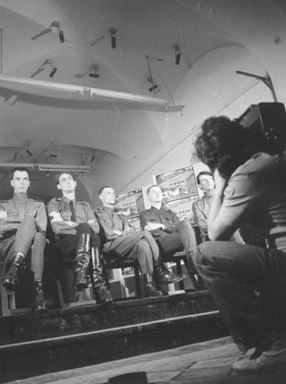Interview in TV Tednik, "Prva TV generacija"

The 23rd of June, Laibach gave an interview on the weekly political/informative TV-show "TV Tednik". The host and the director of the
show was Jure Pengov. After the interview, the infamous political
ban on live performances and use of the band name was issued.
Pengov: So far you have been spreading your ideology, your ideological
provocation in writing. Was your decision to acquaint some 600,000 to 700,000
members of the public with your ideology by appearing on TV in any way difficult?
LAIBACH: Apart from the educational system, television has the leading
role in the formation of uniform opinions. The medium is centralized, with
one "transmitter" and a number of "receivers", while
communication between these is impossible. Being aware of the manipulative
capacities the media possess, Laibach is exploiting the repressive power
of media information. In the present case, it is the TV screen.
Pengov: You have assumed the role of "Public Enemy No. 1"
in a masochistic way as the proverbial sacrifice, while the number of your
true followers, or at least fans, is very questionable. In fact, what exactly
caused one of your leaders commit suicide? Was he crushed by the gap between
the idea and its alienation from the people, masses?
LAIBACH: Art is noble mission that demands fanaticism, and Laibach
is an organism whose goals, life and means are higher - in their power and
duration - than the goals, lives and means of its individual members.
Pengov: What then is your opinion of Edvard Kardelj's (Edvard Kardelj
was closest collaborator of Josip Broz Tito, top party politician and leading
advocate of workers "self - management") brilliant idea that neither
the State nor the System nor the Party can bring happiness to a person -
that one creates one's own fortune?
LAIBACH: Not the State, not the Party, not God, and not Satan; happiness
lies in the total denial of one's human identity, in people's consciously
waiving their personal tastes, beliefs, judgments, in their free depersonalization,
in their ability to make sacrifices, to identify themselves with a higher,
superior system with the masses, the collective, the ideology.
Pengov: Can you tell us anything about yourselves? For instance,
who you are, what your professional occupations are, how old you are; are
you all here or are there more of you?
LAIBACH:
We are the children of the spirit and the brothers of strength,
Whose promises are unfulfilled.
We are the black phantoms of this world,
We sing the mad image of woe.
We are THE FIRST TV GENERATION.
Later, Laibach has this to say to a Yugoslavian magazine:
?: You provoked mass indignation with your television interview, you were condemned as
Neo-nazis and the host of the show, Jure Pengov, proclaimed you Public Enemy Number One.
Today we know that it was a matter of mutual manipulation... Why did you decide to appear
on television? What was your basic intent?
!: The necessity of a comprehensive, structural reconstruction of the Organism and the
collective, psychological and physical reorganization of the spirit of the living
productive force is revealed in a period of the unbridgeable gap between the Idea
and its realization; the establishment of the further disillusioned technicist
consciousness of the individual, with the capacity for maximum identification,
sacrifice and subordination to the higher, superior system of values (the collective,
ideology...) is necessary. The reformational structures need, for the realization of
such a harmonious social balance, an allegiance with progress, decisiveness and the
inclusion of powerful, functional mass media systems of enforcement, mass media such
as TELEVISION.
Television is, within the industry of consciousness (in addition to the school system)
the leading moulder of uniform thought processes. The television program is fundamentally
centralized, with one broadcaster and a mass of receivers/consumers, while communication
between them is disabled. The television message by its nature demands a thorough
involvement of all senses, which causes supersaturation. Such an overload of the sensory
paths (complete focusing on the perceptual region) successfully produces defense reactions
of the organism: hypnotic apathy, lack of critical awareness,... The collective and indepth
experience of the TV message gives rise to an automatic resistance to the details of
cognitive analysis and calls for generalizations of emotional experience; the television
personality (TV sub/ob/ject) becomes spatially and temporally shortsighted, incapable of
analytically foreseeing the consequences or causes, and completely incorporated only in
the television's "present moment." Television thus functionally decreases analytical
capabilities and emotional response, causes apathy and insensitivity, and as such,
psychologically edifies and fortifies the consumer.
LAIBACH, through television perception, by provoking collective emotions
and automatic associations, serves as a reorganizational spiritual principle
and as a means of work incentive: by destroying every trace of individuality
(critical judgment) it blends individuals into a mass and the mass into a single
humble collective, responsible to its own status in the system of production.
